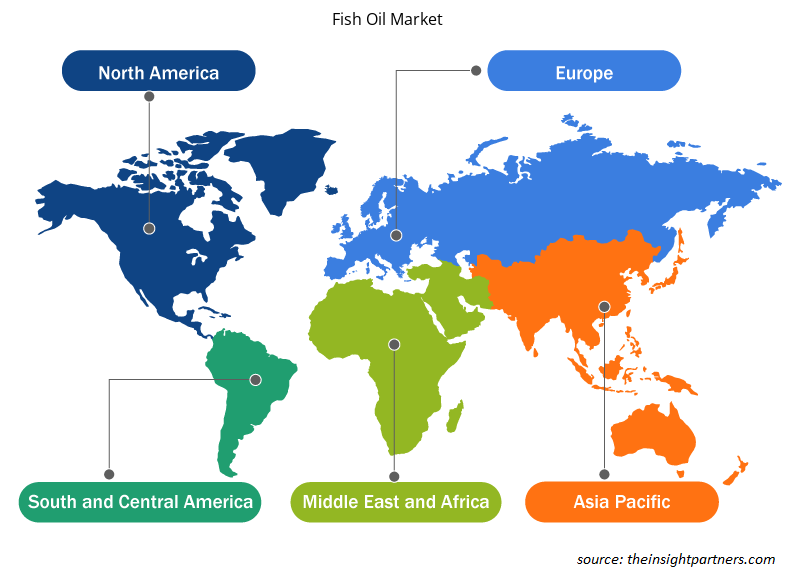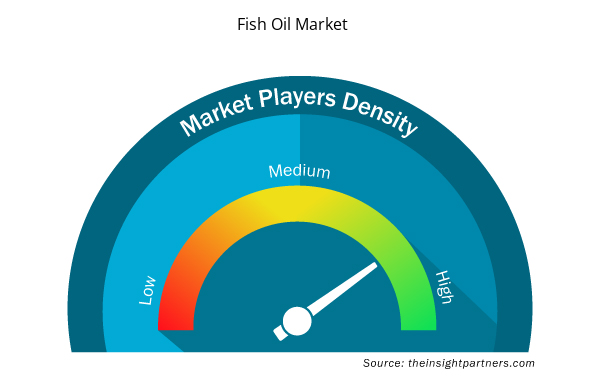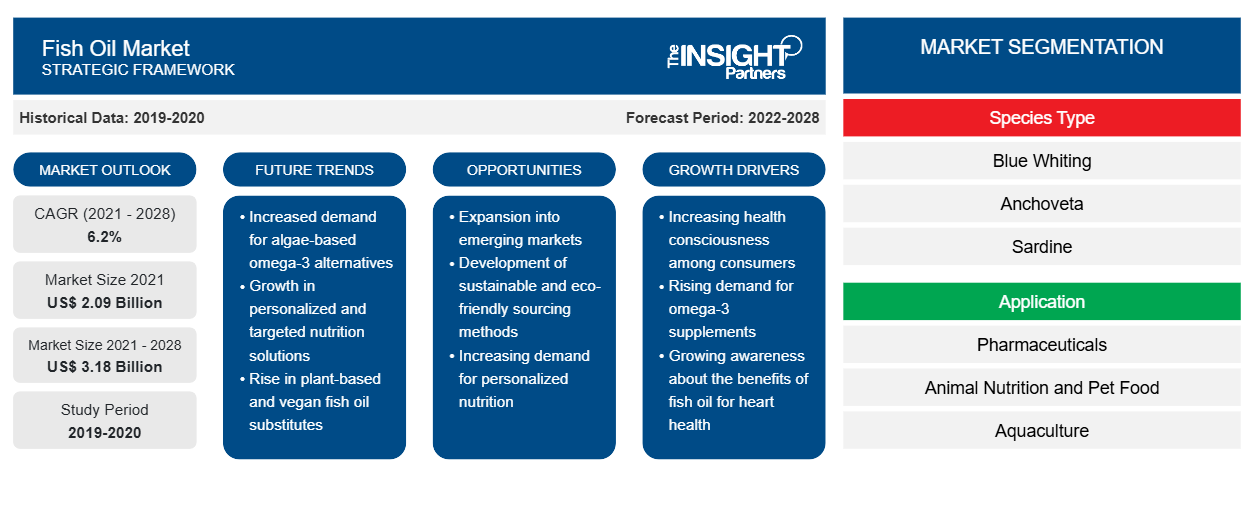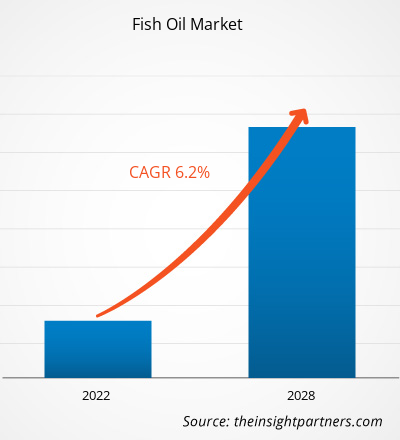Der Fischölmarkt wurde im Jahr 2021 auf 2.087,39 Millionen US-Dollar geschätzt und soll bis 2028 3.178,28 Millionen US-Dollar erreichen. Von 2021 bis 2028 wird ein durchschnittliches jährliches Wachstum von 6,2 % erwartet.
Fischöl wird aus Geweben verschiedener Fischarten gewonnen und enthält Omega-3-Fettsäuren wie Eicosapentaensäure (EPA) und Docosahexaensäure (DHA). Sie bieten verschiedene gesundheitliche Vorteile, darunter ein geringeres Sterberisiko durch Herzinfarkt, gefährliche Herzrhythmusstörungen, niedrigere Triglyceride und Schlaganfälle.
Im Jahr 2020 dominierte der asiatisch-pazifische Raum den globalen Fischölmarkt und wird seine Dominanz im Prognosezeitraum voraussichtlich beibehalten. Das steigende Bewusstsein für die gesundheitlichen Vorteile und das reichhaltige Nährwertprofil von Fischöl treibt das Wachstum des Fischölmarktes in der gesamten Region voran. Darüber hinaus führt die zunehmende Verbreitung chronischer Krankheiten in verschiedenen Ländern der Region zu einer erhöhten Nachfrage nach Fischöl. In Australien beispielsweise leiden schätzungsweise 50 % der Australier an mindestens einer von 8 ausgewählten häufigen chronischen Krankheiten: Krebs, Herz-Kreislauf-Erkrankungen, psychische Erkrankungen, Arthritis, Rückenschmerzen und -probleme, chronisch obstruktive Lungenerkrankung, Asthma und Diabetes. Diese Faktoren dürften das Nachfragewachstum nach Fischöl in der gesamten Region unterstützen.
Passen Sie diesen Bericht Ihren Anforderungen an
Sie erhalten kostenlos individuelle Anpassungen an jedem Bericht, einschließlich Teilen dieses Berichts oder einer Analyse auf Länderebene, eines Excel-Datenpakets sowie tolle Angebote und Rabatte für Start-ups und Universitäten.
- Holen Sie sich die wichtigsten Markttrends aus diesem Bericht.Dieses KOSTENLOSE Beispiel umfasst eine Datenanalyse von Markttrends bis hin zu Schätzungen und Prognosen.
Markteinblicke
Vielfältige Einsatzmöglichkeiten von Fischöl in verschiedenen Branchen
Fischöl wird zunehmend in verschiedenen Branchen verwendet, beispielsweise in der Pharmazie, als Nahrungsergänzungsmittel , in der Tierernährung und in der Tiernahrung . Es findet bedeutende Anwendung in der Pharmazie und gilt als natürliches Öl oder EPA-DHA-Konzentrat. Es wird auch als Tierfutter verwendet, da es wachstumsfördernde Wirkungen hat und eine kostengünstige Energiequelle darstellt. Abgesehen davon wird es auch in Tiernahrung verwendet und hilft, das Immunsystem der Hunde zu stärken, während es auch bei der Bekämpfung von Hundekrebs hilft. Fischöl wird auch als Nahrungsergänzungsmittel verwendet, wobei die Kapseln traditionell aus Gelatine hergestellt werden, die das Öl in den Weichgelkapseln umhüllt. Somit treibt die Verwendung von Fischöl in verschiedenen Branchen das Wachstum des Fischölmarktes voran.
Einblicke in die Artenarten
Basierend auf der Art ist der Fischölmarkt in Blauen Wittling, Sardelle, Sardine, Lodde und andere unterteilt. Im Jahr 2020 war das Sardinensegment das am schnellsten wachsende Segment auf dem Markt. Die Sardine ist ein kleiner, heringsähnlicher Fisch mit verschiedenen ernährungsphysiologischen Vorteilen, die denen anderer Fische wie Lachs ähneln. Das aus der Sardine gewonnene Öl wird auch als Schmiermittel verwendet und kommt hauptsächlich in Farben, Lacken, Biokraftstoffen und Linoleum zum Einsatz.
Pesquera Exalmar SAA; Omega Protein Corporation; Pelagia AS; Copeinca; Coplex International SAC; Triplenine; FF Skagen A/S; DSM; Croda International PLC; und BASF SE sind die wichtigsten Akteure auf dem Fischölmarkt. Die führenden Akteure verfolgen verschiedene Strategien, wie Fusionen und Übernahmen sowie Produkteinführungen, um ihre geografische Präsenz und Kundenbasis zu erweitern.
Bericht-Spotlights
- Progressive Trends in der Fischölindustrie helfen den Akteuren bei der Entwicklung wirksamer langfristiger Strategien
- Von Unternehmen verfolgte Geschäftswachstumsstrategien zur Sicherung des Wachstums in entwickelten und sich entwickelnden Märkten
- Quantitative Analyse des globalen Fischölmarktes von 2019 bis 2028
- Schätzung der Nachfrage nach Fischöl in verschiedenen Branchen
- Porters Analyse zur Veranschaulichung der Wirksamkeit von Käufern und Lieferanten in der Branche, um das Marktwachstum vorherzusagen
- Aktuelle Entwicklungen zum Verständnis der Wettbewerbssituation auf dem Markt und der Nachfrage nach Fischöl
- Markttrends und -aussichten in Verbindung mit Faktoren, die das Wachstum des Fischölmarktes vorantreiben und bremsen
- Verständnis für die Strategien, die dem kommerziellen Interesse im Hinblick auf das Wachstum des globalen Fischölmarktes zugrunde liegen, und Unterstützung des Entscheidungsprozesses
- Fischölmarktgröße an verschiedenen Marktknoten
- Detaillierte Übersicht und Segmentierung des globalen Fischölmarktes sowie seiner Branchendynamik
- Fischölmarktgröße in verschiedenen Regionen mit vielversprechenden Wachstumschancen
Regionale Einblicke in den Fischölmarkt
Die regionalen Trends und Faktoren, die den Fischölmarkt im Prognosezeitraum beeinflussen, wurden von den Analysten von Insight Partners ausführlich erläutert. In diesem Abschnitt werden auch die Fischölmarktsegmente und die Geografie in Nordamerika, Europa, im asiatisch-pazifischen Raum, im Nahen Osten und Afrika sowie in Süd- und Mittelamerika erörtert.

- Erhalten Sie regionale Daten zum Fischölmarkt
Umfang des Fischölmarktberichts
| Berichtsattribut | Details |
|---|---|
| Marktgröße im Jahr 2021 | 2,09 Milliarden US-Dollar |
| Marktgröße bis 2028 | 3,18 Milliarden US-Dollar |
| Globale CAGR (2021 - 2028) | 6,2 % |
| Historische Daten | 2019-2020 |
| Prognosezeitraum | 2022–2028 |
| Abgedeckte Segmente | Nach Artentyp
|
| Abgedeckte Regionen und Länder | Nordamerika
|
| Marktführer und wichtige Unternehmensprofile |
|
Dichte der Akteure auf dem Fischölmarkt: Deren Auswirkungen auf die Geschäftsdynamik
Der Fischölmarkt wächst rasant, angetrieben durch die steigende Nachfrage der Endverbraucher aufgrund von Faktoren wie sich entwickelnden Verbraucherpräferenzen, technologischen Fortschritten und einem größeren Bewusstsein für die Vorteile des Produkts. Mit steigender Nachfrage erweitern Unternehmen ihr Angebot, entwickeln Innovationen, um die Bedürfnisse der Verbraucher zu erfüllen, und nutzen neue Trends, was das Marktwachstum weiter ankurbelt.
Die Marktteilnehmerdichte bezieht sich auf die Verteilung von Firmen oder Unternehmen, die in einem bestimmten Markt oder einer bestimmten Branche tätig sind. Sie gibt an, wie viele Wettbewerber (Marktteilnehmer) in einem bestimmten Marktraum im Verhältnis zu seiner Größe oder seinem gesamten Marktwert präsent sind.
Die wichtigsten auf dem Fischölmarkt tätigen Unternehmen sind:
- PESQUERA EXALMAR SAA
- OMEGA PROTEIN CORPORATION
- PELAGIA AS
- COPEINCA
- COPLEX INTERNATIONAL SAC
Haftungsausschluss : Die oben aufgeführten Unternehmen sind nicht in einer bestimmten Reihenfolge aufgeführt.

- Überblick über die wichtigsten Akteure auf dem Fischölmarkt
Die „Globale Fischölmarktanalyse bis 2028“ ist eine spezialisierte und eingehende Studie der Lebensmittel- und Getränkeindustrie mit besonderem Schwerpunkt auf der Trendanalyse des globalen Fischölmarkts. Der Bericht soll einen Überblick über den Markt mit detaillierter Marktsegmentierung geben. Der Fischölmarkt wird an drei Fronten analysiert: Art, Anwendung und Geografie. Basierend auf der Art wird der Markt in Blauen Wittling, Sardelle, Sardine, Lodde und andere unterteilt. Basierend auf der Anwendung wird der Fischölmarkt in Pharmazeutika, Tiernahrung und Heimtierfutter, Aquakultur, Nahrungsergänzungsmittel und andere unterteilt. Basierend auf der Geografie wird der Fischölmarkt in fünf Hauptregionen unterteilt: Nordamerika, Europa, Asien-Pazifik, Naher Osten und Afrika sowie Süd- und Mittelamerika.
Firmenprofile
- BASF SE
- Copeinca
- Coplex International SAC
- Croda International PLC
- DSM
- FF Skagen A/S
- Omega Protein Corporation
- Pelagia AS
- Pesquera Exalmar SAA
- Triplenin
- Historische Analyse (2 Jahre), Basisjahr, Prognose (7 Jahre) mit CAGR
- PEST- und SWOT-Analyse
- Marktgröße Wert/Volumen – Global, Regional, Land
- Branche und Wettbewerbsumfeld
- Excel-Datensatz



Report Coverage
Revenue forecast, Company Analysis, Industry landscape, Growth factors, and Trends

Segment Covered
This text is related
to segments covered.

Regional Scope
North America, Europe, Asia Pacific, Middle East & Africa, South & Central America

Country Scope
This text is related
to country scope.
Häufig gestellte Fragen
Based on species type, the sardine segment was the fastest-growing segment in the market. Sardine is a small, herring-like fish with various nutritional benefits similar to other species such as salmon. The oil extracted from sardine is also used as a lubricant and is mostly used in paints, varnishes, biofuels, and linoleum.
In 2020, the blue whiting segment accounted for the largest fish oil market share, based on species type. Blue whiting is one of the cod family species and one of the most abundant fish stocks in the semi-pelagic water masses of the Northeast Atlantic. The fish oil derived from blue whiting is a potential source of omega-3 fatty acids.
The market for the pharmaceuticals segment is expected to grow at a faster pace during the forecast period. In various countries, such as Japan, the consumption of nutritional and pharmaceutical-grade fish oil is significantly increasing due to the surge in the presence of the geriatric population, which is likely to result in the rise in demand for pharmaceutical-grade fish oil for various health benefits.
Fish oil is associated with various health benefits and helps in reducing the risk of cardiovascular diseases, lowers blood pressure, and slows the buildup of atherosclerotic plaques. Fish oil is also considered one of the valuable nutrients for both humans and livestock. Fish liver oil and fish body oil are the two types of fish oil. Fish oil is a rich source of Omega-3 fatty acids and includes the presence of vitamins and minerals, such as vitamin A and vitamin D, which are essential for the human body. In addition, the DHA present in fish oil improves memory and cognitive function and plays an important role in the development of an infant's brain. Thus, such health benefits are increasing the demand for fish oil across the world.
The major key players operating in the global fish oil market include Pesquera Exalmar S.A.A.; Omega Protein Corporation; Pelagia AS; Copeinca; Coplex International S.A.C; Triplenine; FF Skagen A/S; DSM; Croda International PLC; and BASF SE.
In 2020, Asia Pacific dominated the global fish oil market. The region is expected to continue its dominance during the forecast period. Trends in this market are influenced by the increasing awareness about the health benefits of omega-3, present abundantly in fish oil. Omega-3 fatty acids are beneficial for the geriatric population as it helps in reducing the risk of chronic diseases and provide preventive measures in terms of heart, cognitive, eye, and joint deterioration.
Trends and growth analysis reports related to Consumer Goods : READ MORE..
The List of Companies - Global Fish Oil Market
- PESQUERA EXALMAR S.A.A.
- OMEGA PROTEIN CORPORATION
- PELAGIA AS
- COPEINCA
- COPLEX INTERNATIONAL S.A.C
- TRIPLENINE
- FF SKAGEN A/S
- DSM
- CRODA INTERNATIONAL PLC
- BASF SE
The Insight Partners performs research in 4 major stages: Data Collection & Secondary Research, Primary Research, Data Analysis and Data Triangulation & Final Review.
- Data Collection and Secondary Research:
As a market research and consulting firm operating from a decade, we have published and advised several client across the globe. First step for any study will start with an assessment of currently available data and insights from existing reports. Further, historical and current market information is collected from Investor Presentations, Annual Reports, SEC Filings, etc., and other information related to company’s performance and market positioning are gathered from Paid Databases (Factiva, Hoovers, and Reuters) and various other publications available in public domain.
Several associations trade associates, technical forums, institutes, societies and organization are accessed to gain technical as well as market related insights through their publications such as research papers, blogs and press releases related to the studies are referred to get cues about the market. Further, white papers, journals, magazines, and other news articles published in last 3 years are scrutinized and analyzed to understand the current market trends.
- Primary Research:
The primarily interview analysis comprise of data obtained from industry participants interview and answers to survey questions gathered by in-house primary team.
For primary research, interviews are conducted with industry experts/CEOs/Marketing Managers/VPs/Subject Matter Experts from both demand and supply side to get a 360-degree view of the market. The primary team conducts several interviews based on the complexity of the markets to understand the various market trends and dynamics which makes research more credible and precise.
A typical research interview fulfils the following functions:
- Provides first-hand information on the market size, market trends, growth trends, competitive landscape, and outlook
- Validates and strengthens in-house secondary research findings
- Develops the analysis team’s expertise and market understanding
Primary research involves email interactions and telephone interviews for each market, category, segment, and sub-segment across geographies. The participants who typically take part in such a process include, but are not limited to:
- Industry participants: VPs, business development managers, market intelligence managers and national sales managers
- Outside experts: Valuation experts, research analysts and key opinion leaders specializing in the electronics and semiconductor industry.
Below is the breakup of our primary respondents by company, designation, and region:

Once we receive the confirmation from primary research sources or primary respondents, we finalize the base year market estimation and forecast the data as per the macroeconomic and microeconomic factors assessed during data collection.
- Data Analysis:
Once data is validated through both secondary as well as primary respondents, we finalize the market estimations by hypothesis formulation and factor analysis at regional and country level.
- Macro-Economic Factor Analysis:
We analyse macroeconomic indicators such the gross domestic product (GDP), increase in the demand for goods and services across industries, technological advancement, regional economic growth, governmental policies, the influence of COVID-19, PEST analysis, and other aspects. This analysis aids in setting benchmarks for various nations/regions and approximating market splits. Additionally, the general trend of the aforementioned components aid in determining the market's development possibilities.
- Country Level Data:
Various factors that are especially aligned to the country are taken into account to determine the market size for a certain area and country, including the presence of vendors, such as headquarters and offices, the country's GDP, demand patterns, and industry growth. To comprehend the market dynamics for the nation, a number of growth variables, inhibitors, application areas, and current market trends are researched. The aforementioned elements aid in determining the country's overall market's growth potential.
- Company Profile:
The “Table of Contents” is formulated by listing and analyzing more than 25 - 30 companies operating in the market ecosystem across geographies. However, we profile only 10 companies as a standard practice in our syndicate reports. These 10 companies comprise leading, emerging, and regional players. Nonetheless, our analysis is not restricted to the 10 listed companies, we also analyze other companies present in the market to develop a holistic view and understand the prevailing trends. The “Company Profiles” section in the report covers key facts, business description, products & services, financial information, SWOT analysis, and key developments. The financial information presented is extracted from the annual reports and official documents of the publicly listed companies. Upon collecting the information for the sections of respective companies, we verify them via various primary sources and then compile the data in respective company profiles. The company level information helps us in deriving the base number as well as in forecasting the market size.
- Developing Base Number:
Aggregation of sales statistics (2020-2022) and macro-economic factor, and other secondary and primary research insights are utilized to arrive at base number and related market shares for 2022. The data gaps are identified in this step and relevant market data is analyzed, collected from paid primary interviews or databases. On finalizing the base year market size, forecasts are developed on the basis of macro-economic, industry and market growth factors and company level analysis.
- Data Triangulation and Final Review:
The market findings and base year market size calculations are validated from supply as well as demand side. Demand side validations are based on macro-economic factor analysis and benchmarks for respective regions and countries. In case of supply side validations, revenues of major companies are estimated (in case not available) based on industry benchmark, approximate number of employees, product portfolio, and primary interviews revenues are gathered. Further revenue from target product/service segment is assessed to avoid overshooting of market statistics. In case of heavy deviations between supply and demand side values, all thes steps are repeated to achieve synchronization.
We follow an iterative model, wherein we share our research findings with Subject Matter Experts (SME’s) and Key Opinion Leaders (KOLs) until consensus view of the market is not formulated – this model negates any drastic deviation in the opinions of experts. Only validated and universally acceptable research findings are quoted in our reports.
We have important check points that we use to validate our research findings – which we call – data triangulation, where we validate the information, we generate from secondary sources with primary interviews and then we re-validate with our internal data bases and Subject matter experts. This comprehensive model enables us to deliver high quality, reliable data in shortest possible time.


 Holen Sie sich ein kostenloses Muster für diesen Bericht
Holen Sie sich ein kostenloses Muster für diesen Bericht